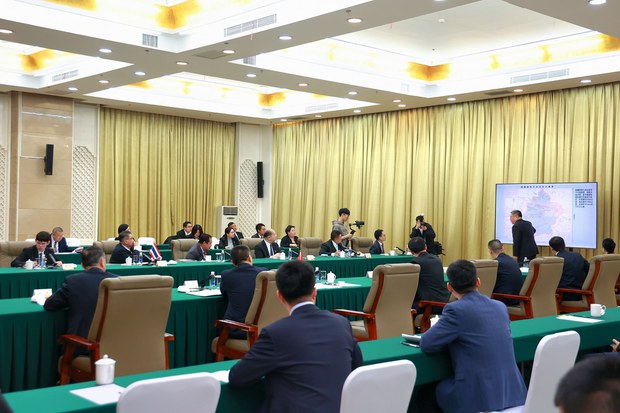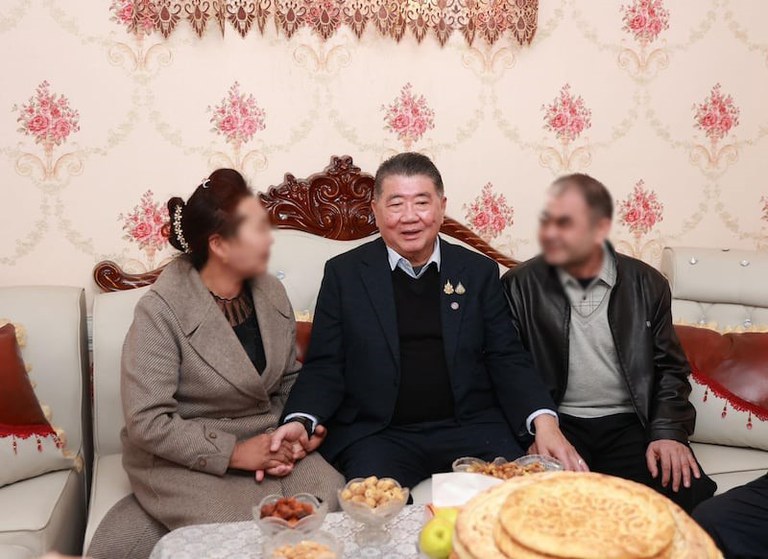Journalists visiting Uyghurs in Xinjiang region face Chinese surveillance
2025.03.20
Bangkok
 Thai Deputy Prime Minister Phumtham Wechayachai and his delegation listen to a briefing by officials from China's Ministry of Public Security regarding the care of the returned Uyghurs in Kashgar, Xinjiang Uyghur Autonomous Region, March 19, 2025.
Thai Deputy Prime Minister Phumtham Wechayachai and his delegation listen to a briefing by officials from China's Ministry of Public Security regarding the care of the returned Uyghurs in Kashgar, Xinjiang Uyghur Autonomous Region, March 19, 2025.
Chinese officials escorted Thai journalists during a controlled visit to Xinjiang this week, insisting on viewing photos and deleting any they didn’t approve of, said a reporter who traveled to China with a delegation checking on Uyghurs deported from Thailand.
Bangkok put 40 Uyghur men on a plane to Xinjiang on Feb. 27, saying Beijing had given assurances that they would not be mistreated and no third country had committed to take them. Thai officials later admitted that the United States and other countries had offered to give the Uyghurs a home.
The men were part of a group of over 300 Uyghurs who fled persecution in China but were caught and jailed in Thailand.
The move was criticized by Western governments and human rights organizations, with the United States restricting visas for unnamed Thai officials involved in the deportation process.
Amid criticism, China invited Thai Deputy Prime Minister Phumtham Wechayachai for a three-day visit to Kashgar in the Xinjiang Uyghur Autonomous Region, beginning on Tuesday. The invitation aimed at showcasing the well-being of the deportees and others who were returned from Thailand in 2015.

A Thai journalist who traveled to the region to report on the Thai delegation said Chinese security officials closely watched the reporters on the trip.
“Thai journalists were escorted by security personnel, who also requested to vet the images before allowing them to be sent back to Thailand,” Pranot Vilapasuwan, news director at Thai-language daily Thairath wrote in a Facebook post.
Pranot said journalists were asked to blur the faces of Uyghurs and their families as well as Chinese officials or to avoid taking pictures of Chinese officials at all.
He also said journalists were vetted before the trip during interviews with Thai authorities.
“This means security agencies were filtering the media,” Pranot said during a program on Thairath online.
RELATED STORIES
Vietnamese in Thailand hope stern US response on Uyghurs might deter deportations s
Thai delegation heads to China to check on deported Uyghurs
US sanctions Thai officials for deporting Uyghurs to China
Sunai Phasuk, a senior researcher at Human Rights Watch, said everything about the Thai government’s Xinjiang visit was “staged” and “managed” by China.
“Thailand is parroting China’s propaganda and collaborating in the crimes against Uyghurs,” Sunai said.
‘Living a normal life’
Thairath cited Phumtham as saying he had video calls with six Uyghurs who had returned from Thailand, one of whom was deported in 2015.
“He explained that after returning 10 years ago, he had been living a normal life, got married and now has a 1-month-old baby,” Phumtham said. “Upon his return, the authorities helped build a house for him.
“I came to visit and wanted answers. We know that Xinjiang has changed a lot, which should be good for them and good for both countries that made this decision,” he said.
Qi Yanjun, China’s vice minister for public security, called cooperation between Thailand and China “normal.”
“Some countries criticize the cooperation between Thailand and China, even though it’s just normal law enforcement, saying it’s not good that both countries are taking such intensive action,” Qi said. “Therefore, both countries, Thailand and China, must strongly oppose this criticism.
“What the U.S. and European Union claimed about inappropriate treatment of Uyghurs is not true. Truth is truth, and everyone will see it.”
Qi’s view was echoed by Tawee Sodsong, Thailand’s justice minister, who said the decision to deport Uyghurs was made on Beijing’s promise they would not be tortured.
“Today, those third countries, which are large nations, may say whatever they want, but we prefer to rely on the truth. We believe both governments are sincere,” he said.
“We saw that he is living with his family. He expressed gratitude to both governments for taking care of him.”







